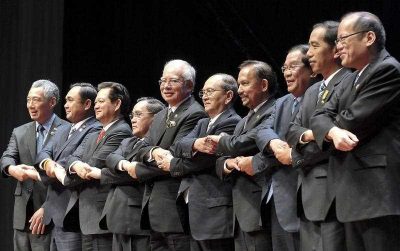20 June 2015, East Asia Forum
Author: Veasna Var, UNSW, Canberra
The South China Sea has become a flashpoint for conflict between China and some of its ASEAN neighbours, particularly the Philippines and Vietnam. China’s recent land reclamation around the Mischief Reef in the Spratly Islands has also strained relations between China and the United States. While, as a non-claimant, the South China Sea is not of direct concern for Cambodia, it holds great relevance to Cambodia as a member in ASEAN.

The US has taken a strong stand against Chinese land reclamation and has conducted surveillance in the area. They claim considerable national interests to be at stake in the South China Sea, particularly with regard to freedom of navigation as well as respect for international norms and law. The US is also asserting its role as protector of ASEAN partners and allies, particularly the Philippines.
The issues are complex because these maritime disputes are related to competition for natural resources, sovereignty, nationalism, historical legacies and geopolitics. Issues of sovereignty prove difficult to solve because each party is highly unlikely to give up any of their claims in the face of possible domestic backlash. These disputes present a serious threat to regional stability as the parties — and China in particular — are increasingly bellicose.
The recent land reclamation has irritated China–ASEAN relationships. The issue is unlikely to be resolved soon, and will have significant impacts on ASEAN’s aspiration for an integrated ASEAN Economic Community by the end of 2015. China’s ability to shape some ASEAN members’ position, alongside members’ pursuing their own national interests on the South China Sea, could erode the core principle of unity and consensus in ASEAN. Competing interests between China on one side, and Vietnam and the Philippines on the other compromised the agenda of the 26th ASEAN Summit in Malaysia in April 2015. After the meeting ASEAN stated that China’s island building had ‘eroded trust and confidence and may undermine peace, security and stability’.
Vietnam put strong pressure on ASEAN members to confront China. According to Vietnamese state media, Prime Minister Nguyen Tan Dung accused China of ‘dangerous and serious violations’ and warned that its land reclamation was ‘directly endangering peace, stability, security, and marine safety’. In response, China said that it was ‘extremely concerned’ by ASEAN’s negative attitude to land reclamation and navigational freedom.
It seems clear that ASEAN is divided in its response to China’s island building. After the summit ASEAN urged all claimants to respect a legally binding code and to engage with China. The chairman’s statement recognises that China is a major trading partner for all ASEAN states and has influence, including its backing for the establishment of the Asian Infrastructure Investment Bank. As a result, some analysts believe that, given China’s economic power and influence, it is very likely that its position in the South China Sea will eventually be accepted. But while Indonesia and Thailand — both of which have strong economic relations with China — supported the chairman’s view, Vietnam and the Philippines pushed ASEAN to stand up against China.
Cambodia has taken a fairly neutral approach to the current South China Sea disputes. In the lead-up to the 2015 summit, Cambodia consistently and firmly reiterated its political stance on South China Sea disputes. Since its first ASEAN chairmanship in 2002, Cambodia has argued that the issue should be resolved only between China and claimant states, not between ASEAN and China.
The Cambodian position is an attempt to find an independent and neutral foreign policy that will not risk upsetting China, Vietnam, the Philippines, or ASEAN as whole. But while Cambodia’s position on this issue may not actually accommodate the national interests of Vietnam and the Philippines, it serves the interest of ASEAN, non-claimants in ASEAN and the wider regional stability interests of the US and its partners and allies. As a non-claimant, Cambodia seeks to balance relations with China, other ASEAN members and the US.
Maintaining the status quo would be a desirable option for Cambodia. The country is likely to remain under pressure from both Vietnam and China for the foreseeable future. It cannot afford to abandon Vietnam as its neighbour, the Philippines as its ASEAN co-member or the US. But nor can Cambodia afford to risk its economic partnership with China.
To best serve its national development interests, Cambodian foreign policy should emphasise its strict adherence to its neutrality, non-alliance and peaceful co-existence approaches as spelled out in the Cambodian constitution. This neutrality provides the best option for Cambodia to effectively deal with complex regional and international situations. It also aligns with Cambodia’s ‘Rectangular Strategy’, which spells out the importance and necessity of integrating Cambodia into the international community.
Keeping all sides in the South China Sea happy is truly challenging for Cambodia’s foreign policy and requires an extraordinary degree of diplomacy. Cambodia could play a diplomatic role in keeping itself informed and warning others not to let differences spill over to the use or threat of force. Cambodia could propose a mechanism that allows Indonesia, Malaysia, Singapore, Vietnam and the Philippines to take the lead in negotiations. At the same time, Cambodia should support, or at least not obstruct, consensus in ASEAN.
Veasna Var is a PhD student in the Program in Political and International Studies at the University of New South Wales at the Australian Defence Force Academy, Canberra.

1 comment:
No middle ground for Cambodia too far from the center.
Post a Comment